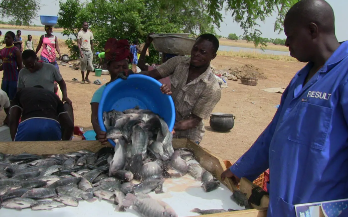
GHANA – In a plea on behalf of the fish farming community, Mrs. Lydia Gyebi Asare, acclaimed as the Eastern Regional Best Fish Farmer and CEO of YaaMansah Farms, is urging the Ghanaian government to impose a ban on fish importation.
Mrs. Asare highlighted the adverse impact of importing large metric tons of fish, particularly affecting catfish farmers and jeopardizing the livelihoods of many in the sector.
During an interview with the Ghana News Agency (GNA), Mrs. Asare underscored the financial strain experienced by fish farmers due to the massive influx of imported fish.
She emphasized the significant investments made in purchasing feed, managing logistics, and paying employee salaries.
“The repercussions of importation have led to substantial losses for local fish farmers, with Mrs. Asare noting that the price of catfish has decreased from GHS 20 to GHS 18 per kilogram,” she noted.
To counteract the challenges posed by excess fish production and sustain the fish farming industry, Mrs. Asare proposed the establishment of fish processing industries.
“These facilities would not only process locally produced fish for domestic consumption but also create opportunities for exportation, contributing to the growth of the sector.”
Mr. Francis Barnes, the Eastern Regional Director of the Fisheries Commission, provided insights into the statistics of fish importation and exportation in Ghana.
He revealed that in the previous year, Ghana imported 165,829.34 metric tons of fish and exported 105,927.48 metric tons, representing a 36% deficit compared to imports.
In 2021, the importation surged to 273,382.32 metric tons, while exports stood at 121,285.87 metric tons, resulting in a 55% deficit.
Mr. Barnes acknowledged the reduction in fish importation percentages and encouraged local fish farmers, assuring them of the brilliant potential within the fish farming industry.
The call for a ban on fish importation aligns with broader efforts to strengthen the domestic fish farming industry in Ghana.
The aquaculture sector has been recognized as a crucial component of the global food system, addressing food insecurity and contributing to socio-economic development.
Ghana has consistently prioritized aquaculture development through strategic plans such as the National Aquaculture Strategic Framework (NASF) launched in 2006 and the subsequent Ghana National Aquaculture Development Plan (GNADP) initiated in 2012.
The GNADP aimed to intensify fish production to 100,000 MT by 2016 through the development of the Akosombo strain (AKOS), capacity-building programs, and the promotion of the private sector in feed and fish processing.
Despite facing challenges such as limited access to finance, inadequate processing technology, and a lack of technical knowledge, the government remains committed to improving the sustainability and productivity of the aquaculture sector.
In a recent study reviewing the Ghana National Aquaculture Development Plan (GNADP), aquaculture emerges as a vital component of the global food system.
